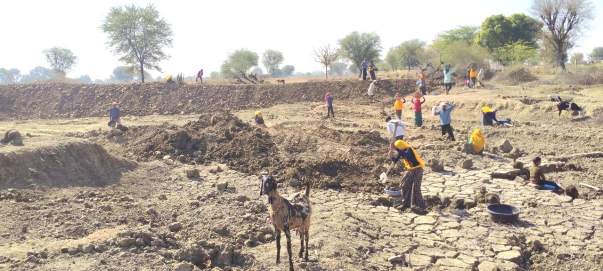Villages in Alwar district of Rajasthan are suffering from water scarcity. The area is surrounded by Aravali hills from all sides. Annual normal rainfall of the region is only about 560 mm, except the short duration of rainy season, the climate mostly remains dry. Women and small children walking many kilometers every day just to fetch drinking water is a common sight.
It may appear surprising to many but in this area availability of water determines whether a rural girl child attends school or not. Availability of water determines whether there will be constructive livelihood opportunities in the villages for its youth or they will be forced to migrate to work as laborer. Availability of water determines nutritional level among community members and opens options for rural prosperity.
It may appear surprising to many but in this area availability of water determines whether a rural girl child attends school or not. Availability of water determines whether there will be constructive livelihood opportunities in the villages for its youth or they will be forced to migrate to work as laborer. Availability of water determines nutritional level among community members and opens options for rural prosperity.

Every aspect of life is associated with availability of water. Its scarcity brings immense suffering to humans, animals and the environment. Poor rainwater conservation is the root cause behind this suffering and the good news is the situation can be reversed by conserving rain water where it falls.
Water table at 220 feet Tilwad (Alwar district of Rajasthan) is yet another village facing acute water scarcity. Only about 5% agriculture area of the village remains under farming due to unavailability of water for irrigation. There is a Nala that flows through it. This Nala offers opportunity as ~ 15243 m3 (152,430,00 L) water can be conserved in it through creating an anicut - a traditional water harvesting structure.
This intervention will have immense benefits for the ecosystem and for the village. Conservation of rain water at this strategic location will effectively restore the health of the ecosystem of the area, will create a micro climate of its own and fosters spaces for biodiversity to thrive. The ‘Anicut’ will recharge about 20 wells and 3 hand pumps in the Tilawad village reducing drudgery of women and girls. It will help about 150 families of the village and positively impact livelihood of about 200 people as the intervention will provide water for irrigation and water and green fodder for about 600 cattles.
Creation of Anicut at Tilwad village will take 3 months and will cost Rs. 8,22,367. This includes cost of the earth work, remuneration for the field expert and technical expert, community engagement and cost for plantation. The entire work will be carried out through community participation.
We request you to donate generously in order to enable us to create Anicut in Tilwad village. This will be third such intervention in this area.
We will keep updating photos and videos so that you can track the progress of the work and see the impact later on in the landscape and lives of people of Tilwad village.
Please note that Aarangar is a registered non-profit organization. We are new and through aims to carry out interventions with high positive impact on environment, rural prosperity and local livelihood generation. A detailed audit of expenses for donors will be provided at request.







